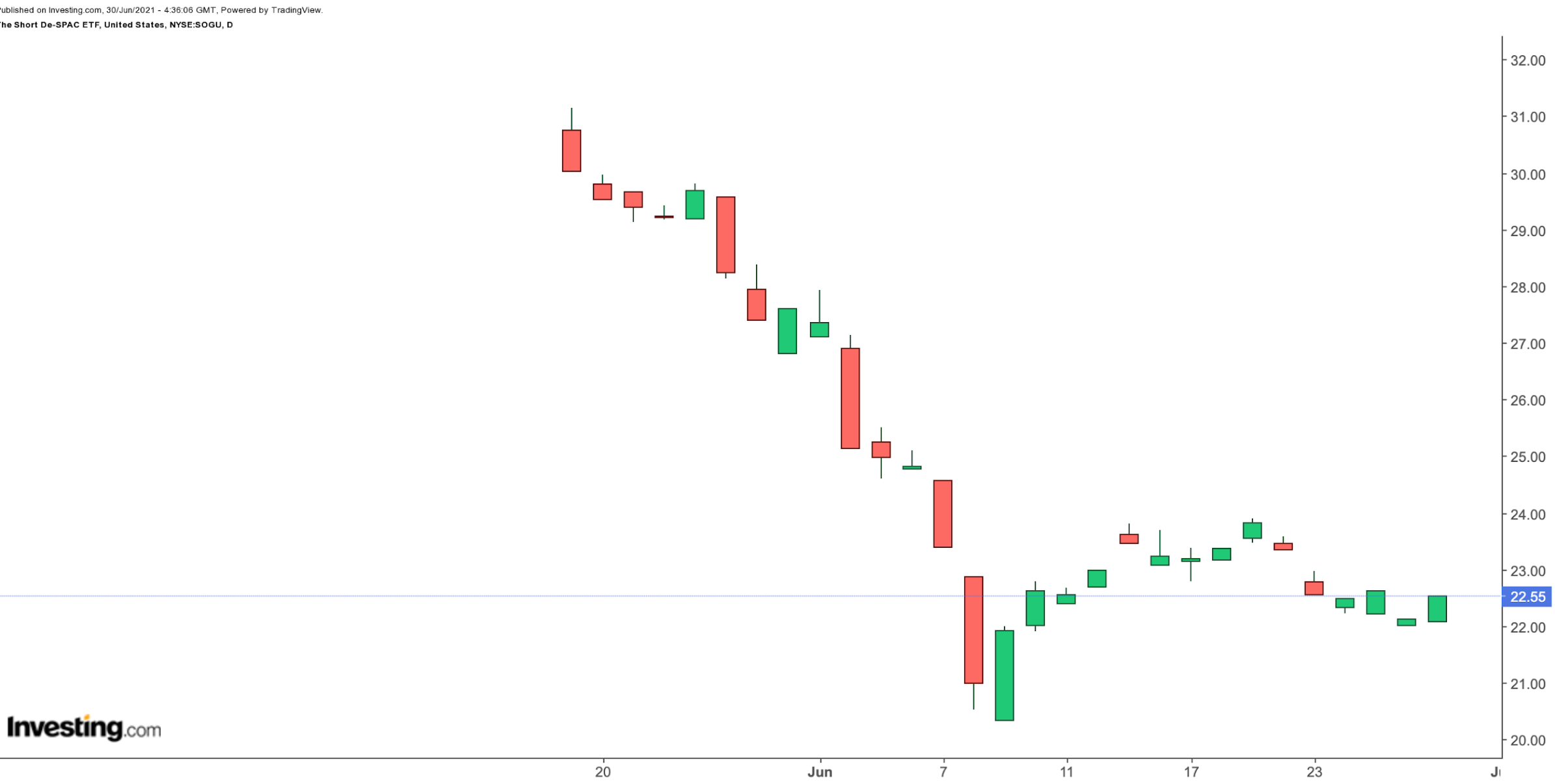Last year was a remarkable period for companies to go public via special purpose acquisition companies (SPACs). In 2020, in fact, there were 248 completed deals in the US. In 2019, that number was 59. In the first of half of 2021 has already seen 350 SPAC reverse-mergers.
As a result, a large number of SPAC companies became the darlings of Wall Street, initially registering double-digit returns in 2020. These stocks include gaming and sports entertainment group DraftKings (NASDAQ:DKNG); clinical-stage biopharma name Immunovant (NASDAQ:IMVT); electric vehicle companies Arrival Vault USA (NASDAQ:ARVL), Lordstown Motors (NASDAQ:RIDE) and Nikola Corp (NASDAQ:NKLA); battery charging infrastructure and storage names ChargePoint Holdings (NYSE:CHPT) and Quantumscape Corp (NYSE:QS); and commercial spaceflight group Virgin Galactic Holdings (NYSE:SPCE).
We previously covered SPACs in detail (here, here and here), and introduced several new exchange-traded funds (ETFs) that could be appropriate for readers bullish on companies that have recently become public by merging with SPACs. Those funds are:
- Morgan Creek - Exos SPAC Originated ETF (NYSE:SPXZ): started trading in January 2021, and is down about 16% since then;
- Defiance Next Gen SPAC Derived ETF (NYSE:SPAK): started trading in October 2020, and is down about 7% year-to-date;
- SPAC and New Issue ETF (NYSE:SPCX): started trading in December 2020, and is up about 12% YTD;
In other words, despite the huge popularity of SPAC companies in 2020, the first half of 2021 has been a mixed year for many of those names as well as the funds that invest in them. Meanwhile, there has also been increased regulatory scrutiny and investor warning from the US Securities and Exchange Commission regarding these blank-check companies.
As analysts debate whether the SPAC frenzy might be over—at least for now—a number of hedge funds have been increasing their short positions in some widely-traded SPAC stocks. On the other side of the equation, we are seeing traders on social media platforms like Reddit or Twitter drive bullish momentum, leading to massive short squeezes.
Therefore, today we introduce a recently-launched fund that could appeal to readers who are bearish on a range of SPAC companies and believe their share prices could decline further in the weeks ahead.
The Short De-SPAC ETF
Current Price: $22.55
52-Week Range: $20.35 - $31.14
Expense Ratio: 0.95% per year
The Short De-SPAC ETF (NYSE:SOGU) has become the first fund to offer short exposure to US-listed companies that went public via a reverse-merger with a SPAC. The fund was launched on May 19 by Tuttle Tactical Management, which is also behind The De-SPAC ETF (NYSE:DSPC). SOGU’s net assets stand at almost $13 million. All to say, it is a small, young fund.

SOGU aims to provide an inverse (-1x) return of the De-SPAC Index for a single day. We previously covered inverse ETFs and how they could be more appropriate for experienced short-term traders, but not necessarily for buy-and-hold portfolios. At the very least, caution is necessary when buying these inverse funds.
Traders who buy SOGU would currently be betting against 25 companies held in the ETF. Among the leading names are:
- Appharvest (NASDAQ:APPH) — agriculture technology company that is building an indoor farm in Appalachia, up 0.3% YTD;
- BTRS Holdings (NASDAQ:BTRS) — business to business accounts receivable automation and payments group, down 21.9% YTD;
- ChargePoint (NYSE:CHPT) — down 9.6% YTD;
- Desktop Metal (NYSE:DM) — manufacturer of 3D printing systems, down 29.3% YTD;
- Hims Hers Health (NYSE:HIMS) — telehealth platform, down 25.6% YTD;
- Lordstown Motors — down 42.9%.
Since inception, the ETF is down about 24%. Short-term traders who are bearish on SPACs and want to have a “one-ticker” access to a short vehicle might find the ETF worth researching further.
